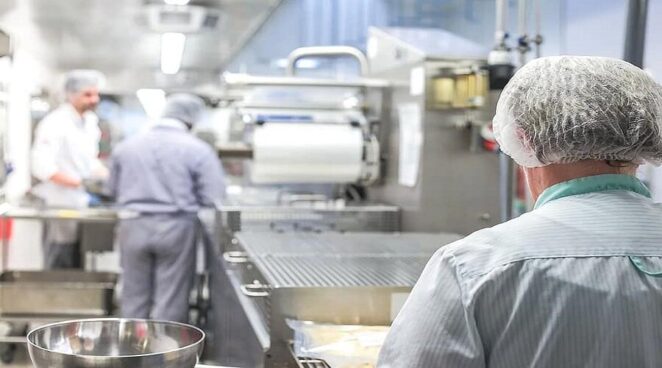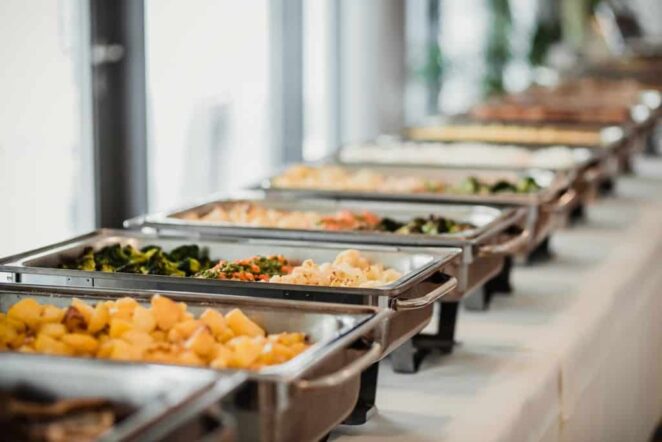Food service businesses can be exposed to the most significant risks by mishandling or improperly storing food.
Failure to follow basic safety procedures can result in sick customers, local health department fines, and lawsuits.
A food handler license is a great way to provide training for your staff and customers. It will also help you keep your business running smoothly. You can also gain a competitive edge by obtaining a food handler certificate or card at 360training.com.
What is a food handler license?
A food handler license (also known as a food card or food handlers permit) is a certificate that shows local health departments that you are competent in safely handling and serving food to the public.
Most states require it. You could be subject to fines or other penalties by your local health department if you don’t have one.
How to obtain a food handler’s license

Most food handler license programs follow the same format: you must take a course in food safety and then pass a test.
Although it might seem like a huge time commitment, most people can get a license quickly and easily.
The average course takes around two hours and costs less than $20. Many courses are available online or in person.
Many companies offer courses in food safety. Each one is different. They all offer instruction on the following:
- Basic food safety
- Proper food storage practices
- Proper personal hygiene practices
- Allergens
- Cross-contamination
- Proper cleaning procedures
You can take the exam three times after completing a course. You will need to retake the course before retaking the exam.
After passing the exam, your certificate as a food handler will be issued.
Many licenses are online and can be printed right away. Depending on your course, some licenses can be used forever, while others must be renewed every few years.
Certificate courses for food handlers
Be sure to check that the course is approved by the state where your food service business is located before deciding on a course. These are some of the most popular choices:
- Always Food Safe The company offers a variety of training options to suit different employees. Online courses are only available in video format. Food handler training costs $10. Once you pass the exam, your certificate can be printed.
- ServSafe. ServSafe is a popular course in food safety in America. It can be taken online or in person. Once you have passed the food handlers exam, your e-certificate can be downloaded and printed from the company’s site.
- National Registry of Food Safety Professionals. NRFSP provides self-study and online and in-person training. After passing the exam, you can access your account to print your certificate as a food handler. The cost for the online version is $12.95.
A food handler license is not required

Most states require at least one licensed employee for every food service company.
Some employers require that all food handlers obtain a license.
Some states require at least one licensed person to be present during business hours. However, they only require some employees to be licensed.
Even though your state or local government may not require certification for everyone, it is important to train all employees in proper food handling techniques to avoid getting sick.
Different states have different requirements for food safety
The requirements for licensing vary depending on where you live.
New York, for example, requires all food-handling businesses to have a licensed food supervisor available during business hours. However, all employees don’t need to be issued a food handler card.
California, however, requires that all food-handling employees have a license.
Check with your local health department for specific information that applies to your business.
Sometimes, the requirements of state and local governments are different. To avoid possible penalties, adhere to stricter regulations if your state or local governments have different requirements.
It’s crucial to determine how long you can wait before you are licensed if you are just starting out. Most states require that food service businesses open within 30 to 90 calendar days to obtain a food handler license.
It is crucial to understand how long each employee must complete training before they can pass the licensing exam if you live in an area where licenses are required for all employees.
The benefits of a food handler license

A food handler license is critical for any food service business looking to remain legally compliant and operate in accordance with all laws regarding food safety and hygiene. Having a certified staff is essential for ensuring a safe and sanitary kitchen, protecting both the public and the business itself. It can benefit your business in many ways including:
- Improving customer relations – customers will know that you are taking safety seriously, promoting trust and confidence in your food products.
- Enhance professional credibility – a certified team demonstrates to health inspectors, auditors or clients that your staff has been properly trained in safe food handling requirements.
- Reduce liability – a potent combination of professionally trained staff overseeing the handling of foods helps protect businesses from potential lawsuits from customers claiming illness from contaminated products.
- Saving money – Failing inspections can result in costly repairs or facility closures that can negatively affect revenues and turnover rates. Certified staff means fewer (if any) fines due to higher safety standards.
- Improve reputation – when customers know that your business’s facilities have been vetted by someone knowledgeable about public health standards, they have greater confidence in the safety and quality of the foods you offer. Improved reputation leads to more clients and better customer relationships over time.
Conclusion
In conclusion, having a food handler license demonstrates your commitment to food safety and the quality of your service. Formal education in food sanitation can provide your staff with enhanced knowledge and improved methods for preventing contamination and illnesses. In many regions, having this certification is also required by government regulations to protect consumers and ensure food safety. Moreover, with a certified Food Handler on staff, you can show current customers as well as potential clients that you keep up with the industry standards and prioritize health concerns when it comes to running a successful business in the food service industry.




